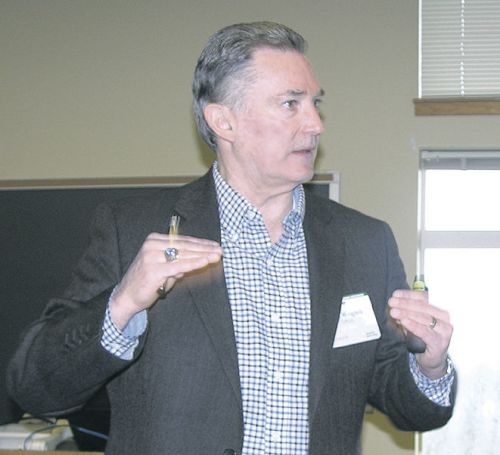Potato leader looks to grass seed
Published 8:51 am Thursday, February 28, 2013

- Mitch Lies/For the Capital Press CEO of United Potato Growers Jerry Wright speaks to participants in the Oregon Grass Seed Bargaining Association's annual meeting Feb. 22 in Salem on the value of sharing information on planted acreage and other facets of grass seed operations.
Potato growers have united, ‘learned the value of data’
By MITCH LIES
Capital Press
SALEM — For 20 years, between 1985 and 2005, potato growers averaged a 1 percent return on investment, according to Jerry Wright, CEO of United Potato Growers of America.
Over the next four years, under the leadership of Wright and a commitment by the industry to match supply with demand by cutting acreage, potato farmers averaged a 29.9 percent return on investment.
That immediate and continued ability to turn a profit in potatoes can occur in grass seed, too, Wright said, if growers are willing to share knowledge and work together to control supply.
In an Oregon Grass Seed Bargaining Association meeting where a USDA statistician unveiled results of Oregon’s first official grass seed survey in more than 30 years, Wright talked about the benefits of sharing knowledge.
Wright said potato growers asked him in 2005 to help reverse a three-year slide in potato prices.
“They all came together because the losses were so intense,” he said. “It was so bad that they were willing to set all their weapons aside and come together, and in one giant act of faith, try something different.”
Wright said he asked the growers for information on demand and inventories.
“They had no clue,” he said. “They had all of this USDA data, and they didn’t know what to do with it, and no one ever looked at it.”
Today, he said, the potato industry is considered one of the biggest users of USDA data in all of agriculture.
The result, he said, is a fundamental change in the way potato growers do business.
“We have changed the fundamentals in the potato category for good,” Wright said. “They will never go back to where they were, because they have learned the value of data.”
Wright told growers in the Feb. 22 meeting that it isn’t necessary to obtain 100 percent participation to influence supply.
“If your requirements are that 100 percent, or even 85 percent of the people are going to go along with you, it ain’t going to happen. Don’t fool yourselves into thinking that,” he said.
“But if you can get 60, 65 percent of the people that are like-minded and are willing to do the right things together, you can make money,” he said. “That is what this whole system is about.”
Wright said that rather than harming an operation’s profit potential, giving up information on planting intentions and other facets of an operation helps grower positions.
“To get control of your destiny, you have got to give up some individual control,” he said.
“The bottom line is you need actual data to make intelligent decisions,” he said.









